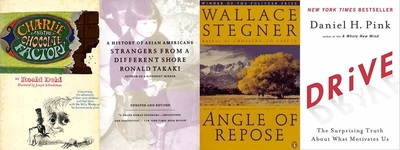Since launching the Books that Shaped Work in America project in November, I've found myself asking people (during lunch with colleagues, at dinner with friends, in line at the DMV): "So, what books have shaped YOUR view of workplaces, workers or just the idea of work? What books have influenced your 'work history?'"
A few titles always come up: "Working" by Studs Terkel, of course. "The Jungle" by Upton Sinclair and "The Grapes of Wrath" by John Steinbeck are popular picks. But after asking a few more questions, people talk less about the obvious books that have impacted their view of work and focus more on books that impacted them in remarkable, sometimes personal ways.
For example, former Labor Secretary George P. Shultz put Walt Whitman's collection of poetry, "Leaves of Grass" on his list pointing out that the book "made readers see the dignity of labor and the great skills needed to make a job successful." Marc H. Morial, who heads the National Urban League, included Claude Brown's 1965 novel "Manchild in the Promised Land." His rationale? You cannot talk about work in America without talking about poverty in America. He's right, and Morial is making real strides in fighting poverty today.
For Department of Labor Deputy Chief of Staff Seema Nanda, the four books she chose were personal - specifically, titles that influenced her views of work at various stages throughout her life. Today, we are adding these four titles to our list: "Charlie and the Chocolate Factory," "Strangers from a Different Shore," "Angle of Repose" and "Drive."
I love these additions, for a variety of reasons. First, they are all great reads. Second, they're a wonderful mix: a children's book, an exhaustingly researched history, a great American novel and a totally modern "how come/how to." But mostly, I love that Seema's essay demonstrates what I love most about this project.
You'll discover that she realized important facets about work during key points in her life: as a child, enjoying the adventure of a young boy in "Charlie and the Chocolate Factory"; as an inquisitive college student, exploring her culture and identity through "Strangers from a Different Shore"; as an adult, simply enjoying the pleasure of great storytelling in "Angle of Repose"; and as a public-sector leader, learning, understanding and appreciating what motivates employees (and herself) by studying the lessons from "Drive." Read her thoughtful essay and you'll understand her "work history." Everyone has one. And books play an important role.
What books would you add? Share with us the titles that shaped your own "work history."
Carl Fillichio heads the Labor Department's Office of Public Affairs and serves as the chair of the department's centennial. Learn more about the department's 100 years of service by viewing an interactive timeline and watching a special centennial video.
